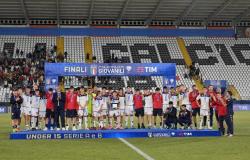Two international study days on 15 and 16 June 2004 in Ragusa (Italy) under the aegis of: Laboratory of the Annals of History, Sorbonne Université de Paris, University of Genoa, University of Bari, University of Siena, Unitelma -Sapienza, University of Rome, University of Messina, Center National de la Recherche Scientifique France, Fernand Braudel Maritime and Naval History Laboratory of Unige.
After four international scientific events dedicated to the technological role of wood in human history, to a historical review of the Middle Ages as a logical age and of the languages of Europe, to the Copper Man as an inciter of history and to the birth of historical war, Ragusa for the fifth time it is home to a scientific forum of global importance. This is the 5th international study conference entitled Migrations and great paths of history: the sea, the deserts, the ice, the steppes. Looks at the mobilities that have oriented human eras, which will come into focus throughout the day of Saturday 15 June 2024 and end on the evening of the following Sunday.
Even the 5th Conference, developed and directed like the previous ones by prof. Carlo Ruta, historian, theorist of history and director of the Laboratory of the Annals of History, was born from the scientific partnership with the Sorbonne University of Paris, the French Center National de la Recherche Scientifique, the University of Siena, the University of Bari, the University of Messina, the University of Genoa Unitelma-Sapienza University of Rome, the Fernand Braudel Laboratory of the University of Genoa.
On the meaning and scientific objectives of this international study appointment, Prof. Carlo Ruta explains: «It is, in the first instance, necessities that move history and make its cultural sediments. And great needs inevitably call into question great mobility. Throughout the ages, the populations of the Earth, even sedentary by temperament, have never stopped moving. Essentially, history is therefore made up of itineraries, material and imaginative, social and cultural crossings. Even before the courts, the chancelleries and the ordered orthogonal layouts of the capitals, it passes through the lively geographies of the extreme and the unstable.” And so the professor continues. Ruta: «It is the long story of seas, steppes, deserts, routes of ice and frost which, as can be seen, have given decisive turning points, both material and cultural, to the life of the continents. It is therefore important that a new and close comparison is established with these phenomenologies, which have drawn and radiated rationality, manual skills and knowledge from the disconnection, the unstable and the unpredictable”.
Finally, the historian illustrates the methodological criteria that inspire the 5th Conference: «As has happened in other study meetings and as is the mission of this scientific project, interdisciplinary experience is privileged. Furthermore, common threads inspired by targeted elaborations during construction are followed. Even the field chosen for this international conference, mobilities and the great paths of history, is sufficiently broad but the boundaries are clearly defined, because the mission remains that of producing new and cohesive knowledge. Here too, therefore, a complex and difficult work experience opens up, of which a series of resistant memory tools will remain.”
The Conference will open on the morning of June 15th with an extensive report by the scientific director Carlo Ruta, on a paradigmatic journey that will converge on the model of long distance as a driving force of history and dynamic axis of civilizations, after which a first debate will open. The afternoon session will be followed by the reports of the following scholars: the paleethnologists Alberto Gazzella and Giulia Recca (Sapienza University of Rome), the epistemologist Giuseppe Varnier (University of Siena), the historian of philosophy Annamaria Anselmo (University of Messina), the Egyptologist Frenchman Juan Carlos Moreno García (Sorbonne Université Paris), the glottologist Michele Longo (University of Palermo), the sociologist Eleonora Sparano (UnitelmaSapienza of Rome), the anthropologist Annalisa Di Nuzzo (Benincasa University of Naples), the historian Sandra Origone (University of Genoa), the mathematical physicist Luigi Russo. The second discussion will follow from 7pm to 8.30pm.
The debate will resume on the morning of Sunday 16 June with the reports of the following scholars: the American sinologist Pamela Kyle Crossley (Dartmouth College), the historian Antonello Folco Biagini (Sapienza University of Rome), the historian Emiliano Beri (University of Genoa, the Rector of UnitelmaSapienza Bruno Botta, the historian Gianclaudio Civale State University of Milan), the theoretical philosopher Giuseppe Gembillo (University of Messina), the philosopher Andrea Velardi (Xenophon College London), the anthropologist and geographer Matteo Meschiari (University of Palermo), the geographer Giuseppe Bettoni (Tor Vergata University of Rome), the archaeologist Claudio Giardino (University of Salento), the archaeologist Bianca Maria Giannattasio (University of Genoa). The third debate will follow.
Finally, the final session will be held from 5pm to 8pm on 16 June, with the conference The Fifth Way of History. The “colonization” of space and the expansion of the world-village, from the aerial revolution of the early twentieth century to satellite systems: what changes?, with the opening report by Carlo Ruta and interventions by Anna Maria Anselmo, Giuseppe Bettoni, Gianclaudio Civale, Giuseppe Gembillo, Matteo Meschiari, Sandra Origone, Eleonora Sparano, Giuseppe Varnier, Andrea Velardi. The debate will follow.
Finally, once the proceedings have concluded, the scientific director of the Laboratory will announce the theme and date of the 6th international conference.






